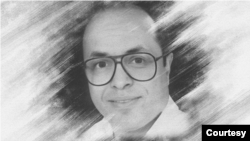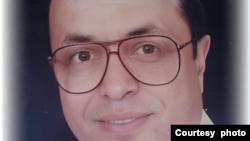In November, veteran journalist, fixer and translator Mohammed Dawwas died in Gaza after fleeing fighting. Mohammed, who had suffered a stroke, lost access to medical care because of the Israel-Hamas war. Following is a tribute to his life and his work with VOA and other news agencies.
Entering the Gaza Strip in the years after Hamas took control of the tiny Palestinian enclave in 2007 was harrowing, says veteran VOA journalist Luis Ramirez.
After being cleared by Israeli security, Ramirez would head down a gravel path, loaded with luggage and journalism gear, including body armor. Israeli soldiers watched from behind as he walked through the abandoned battle zone, a no man's land between Israel and Gaza.
Ahead of him, Hamas soldiers watched his slow approach to their checkpoint.
"There was this roughly one kilometer of just utter devastation on either side," Ramirez said. "It certainly made for a very sinister prelude to what one was about to see in Gaza."
After leaving the Hamas checkpoint, Ramirez went to a parking lot behind a chain-link fence, where families waited for friends or loved ones coming from the other side of the border.
Local journalists, known as "fixers," would wait for foreign colleagues. Among them, Mohammed Dawwas.
A well-known journalist, Mohammed worked for several major news outlets, including VOA, the BBC, The Independent, Der Spiegel, La Repubblica and The Sunday Times.
"Once I spotted him, I knew everything was going to be OK, in a place that was not OK," Ramirez said.
Life in Gaza
A life in journalism began by chance for Mohammed, according to his daughter, Yasmin Dawwas. The 32-year-old doctor has spent recent months helping surviving family members escape Gaza.
In the late 1980s, Mohammed was at a university in the United States, his daughter says, and he bought a return ticket to visit his parents. But when he got to Gaza, he found his mother was ill. So he stayed.
"One thing led to another," said Yasmin. "He got married to my mother and then he started his working as a journalist."
Mohammed's career took off around the time of the first Oslo Accord, a milestone interim peace agreement between Israelis and Palestinians in 1993, which calmed hostilities for a brief time and brought a flood of foreign journalists and international interest to Gaza.
Mohammed spoke English fluently, and he went to work telling the story of the people of Gaza, beyond the headlines generated by politicians and militant leaders.
He really wanted to play a part in reporting the suffering and trying to break the stereotyping of people in Gaza.Yasmin Dawwas
"He didn't feel that enough reporting was done from Gaza internationally," Yasmin said. "And he really wanted to play a part in reporting the suffering and trying to break the stereotyping of people in Gaza."
In 2007, fighting broke out between rival political parties Fatah and Hamas, after Hamas won the Palestinian parliamentary elections. When Hamas — considered a terrorist organization by both Israel and Egypt — also won the physical fight, the borders were closed on both sides, devastating the local economy.
By the end of 2008, Hamas fired rockets into a nearby Israeli town, and Israeli bombs sailed into the strip, beginning the first of several bloody conflicts. Roughly 3,400 Palestinians and 80 Israelis were killed in the decade that followed.
During that time, Mohammed was on the ground, documenting the conflicts with the foreign press and keeping records of life in the war zone. He became well-known among journalists for having contacts with all the parties involved. He had sources in hospitals and ministries, with local military officials and among the civilian population.
He worked with VOA's Ramirez, and other foreign correspondents, including Scott Bobb.
Recalling Mohammed, Bobb said: "What struck me was how thorough he was. He was well prepared, and he always delivered."
Mohammed took Bobb to often unseen parts of Gaza, such as the entrances to the enclave's famed tunnels. These range from ventilated concrete-walled passageways that are kilometers long and dozens of meters deep and can hide the movements of military groups, to 2-meter-wide dirt tunnels.
"Normally you were not allowed to access those as a foreigner or a journalist," said Bobb. "He got me in because he knew when the Hamas guards, or whatever they were, took their break. And so, we went in, and we did the interview and shot the footage and got out before they came back."
The Now War
For many people in Gaza, the war that began October 7, 2023, has been the hardest part of a lifetime of struggle.
Mohammed was already in poor health from an earlier stroke. Shortly after the Hamas assault on Israel that began this conflict, he had a second stroke. About a week later, the Israeli army told civilians to flee northern Gaza. Mohammed couldn't walk, but the family made their way south, leaving behind the specialized equipment needed for his care.
At first they stayed in the home of relatives. But a month or two later, that area was evacuated as Israeli forces moved in.
It was after the second move that Mohammed's health problems became life-threatening. The family tried to get him admitted to hospitals, but they were packed with war wounded and related emergencies.
"[My mother and my sisters] did everything they could, but at the end, he passed away," said Yasmin. "And the ambulance only came after he passed."
Mohammed died on November 25, 2023, during a weeklong cease-fire that allowed for the return of 100 Israeli hostages and nearly 250 Palestinian prisoners. The cease-fire also allowed for Mohammed to be buried according to Islamic traditions and for his family to have a small service.
Mohammed's family believe he would have survived if he had had access to medical care.
A few days after burying their father, the family was forced to flee again.
These later evacuations were the hardest, according to Abed Alhakeem Abusamra, a 65-year-old journalist in Gaza and a longtime colleague and friend of Mohammed's. As most of Gaza's 2 million-plus residents moved into the southern part of the 41-kilometer strip, it became harder for even the young and healthy to stay alive.
"We are suffering from lack of hygiene, health care and healthy food. Everything," said Abusamra. "Now I'm with my family, 12 members living in a tent, 3.5 by 5 meters… not good even for animals."
True Legacy
Mohammed died during a terrible time in Gaza's history, says Abusamra, but his contribution will not be forgotten.
"Our families were happy and were glad to know each other well on a personal level," he added. "Mohammed was a smart person. … He was a loving and polite person."
Mohammed was husband and a father of eight children, including five girls. He loved the sea, and his farm, where he raised chickens and oranges.
"He was much more of a friend to us," says Yasmin. "He was very receiving of everything we wanted to say and very supportive. We had our freedom of thinking."
Yasmin remembers her father's tears through the window of her hospital room, where she was treated for asthma when she was a child. Inside the room, he would make the treatment fun, with conversation and laughter. "I had to tease my sister because I'm getting more attention from him," Yasmin said.
It just reminds you that those horrific numbers of death aren't just numbers.Sonja Pace
Journalists from VOA remember Mohammed with a mixture of admiration and sorrow, saying his death at this time of war has a meaning for outsiders beyond the loss of their colleague.
"It just reminds you that those horrific numbers of death aren't just numbers," said Sonja Pace, a VOA correspondent who worked with Mohammed in Gaza in the early 2000s. "They are people. They are families. They are husbands and fathers and brothers and mothers and wives and sisters."
His death also echoes a loss felt every time the journey into Gaza was reversed, according to Ramirez.
Inside Gaza, the journalists covered violent battles, overcrowded hospitals and families in mourning. But the fact that these horrors all played out behind shuttered borders, unpassable to most people in Gaza, made leaving the strip heartbreaking.
"Saying goodbye to a trusted colleague and friend. ..." Ramirez said, "Every time, never knowing if I'd ever see him or hear him again in those just visually jarring circumstances was really hard, and something that stuck with me forever."






